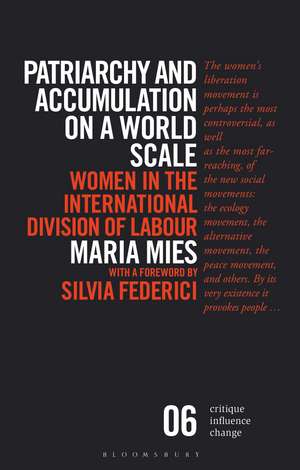Patriarchy and Accumulation on a World Scale: Women in the International Division of Labour: Critique Influence Change
Autor Maria Mies Cuvânt înainte de Silvia Federicien Limba Engleză Paperback – 18 mai 2022
| Toate formatele și edițiile | Preț | Express |
|---|---|---|
| Paperback (2) | 102.33 lei 3-5 săpt. | +14.55 lei 4-10 zile |
| Bloomsbury Publishing – 18 mai 2022 | 102.33 lei 3-5 săpt. | +14.55 lei 4-10 zile |
| ZED BOOKS – 31 ian 1999 | 160.20 lei 45-57 zile |
Preț: 102.33 lei
Nou
Puncte Express: 153
Preț estimativ în valută:
19.58€ • 21.26$ • 16.45£
19.58€ • 21.26$ • 16.45£
Carte disponibilă
Livrare economică 01-15 aprilie
Livrare express 15-21 martie pentru 24.54 lei
Preluare comenzi: 021 569.72.76
Specificații
ISBN-13: 9781350348189
ISBN-10: 135034818X
Pagini: 280
Dimensiuni: 138 x 216 x 18 mm
Greutate: 0.35 kg
Editura: Bloomsbury Publishing
Colecția Bloomsbury Academic
Seria Critique Influence Change
Locul publicării:London, United Kingdom
ISBN-10: 135034818X
Pagini: 280
Dimensiuni: 138 x 216 x 18 mm
Greutate: 0.35 kg
Editura: Bloomsbury Publishing
Colecția Bloomsbury Academic
Seria Critique Influence Change
Locul publicării:London, United Kingdom
Notă biografică
Maria Mies is a Marxist feminist scholar who is renowned for her theory of capitalist patriarchy, which recognizes third world women and difference. She is a professor of sociology at Cologne University of Applied Sciences, but retired from teaching in 1993. Since the late 1960s she has been involved with feminist activism. In 1979, at the Institute of Social Studies in The Hague, she founded the Women and Development programme. Her other titles published by Zed include The Lace Makers of Narsapur (1982), Women: The Last Colony (1988), The Subsistence Perspective (1999) and Ecofeminism (2014).
Cuprins
Foreword by Silvia Federici Preface to the critique influence change edition Introduction 1. What is Feminism? 2. Social Origins of the Sexual Division of Labour 3. Colonization and Housewifization 4. Housewifization International: Women and the International Division of Labour 5. Violence Against Women and the Ongoing Primitive Accumulation of Capital 6. National Liberation and Women's Liberation 7. Towards a Feminist Perspective of a New Society
Recenzii
Compelling. One of the most ambitious projects undertaken by a feminist scholar in recent years.
In Patriarchy and Accumulation on a World Scale, Maria Mies drew connections between two structures of domination that had previously been viewed separately. In showing the convergence between patriarchy and capitalism, she has pushed intellectual boundaries, and has enriched feminism, women's struggles, and movements for social and economic justice. If you want to understand the roots of the economic crisis, and of violence against women, read this book. If you want to create alternatives and participate in shaping living economies, read this book. Patriarchy and Accumulation is essential reading for all, more so today than when it was first written.
Maria Mies' vision is huge, the scale of her project breathtakingly bold.
Feminist theory at its very best.
A major contribution to authentic development theory and practice. Women cannot hope for justice from a mode of production built on subordination either as housewife in the West or cheap labour in the third world. Mies produces an alternative feminist concept of labour and some strategic elements of its implementation. The critique is compelling.
In Patriarchy and Accumulation on a World Scale, Maria Mies drew connections between two structures of domination that had previously been viewed separately. In showing the convergence between patriarchy and capitalism, she has pushed intellectual boundaries, and has enriched feminism, women's struggles, and movements for social and economic justice. If you want to understand the roots of the economic crisis, and of violence against women, read this book. If you want to create alternatives and participate in shaping living economies, read this book. Patriarchy and Accumulation is essential reading for all, more so today than when it was first written.
Maria Mies' vision is huge, the scale of her project breathtakingly bold.
Feminist theory at its very best.
A major contribution to authentic development theory and practice. Women cannot hope for justice from a mode of production built on subordination either as housewife in the West or cheap labour in the third world. Mies produces an alternative feminist concept of labour and some strategic elements of its implementation. The critique is compelling.




